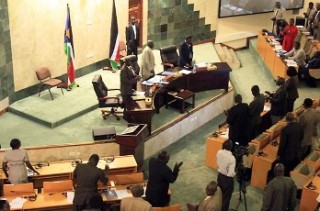South Sudan parliament a “rubber stamp”, says ex-MP
By Tesfa-Alem Tekle
September 4, 2014 (ADDIS ABABA) – A South Sudanese lawmaker recently unseated from the national assembly has described the legislative arm of government as a “rubber stamp” institution.

One of the 23 MPs removed from the assembly over absenteeism, Tang currently represents the Sudan People’s Liberation Movement in Opposition (SPLM-IO) in Washington.
“If this parliament breaks our nation’s laws with impunity, what would become of our nation and its citizens? Where would ordinary people go to seek justice, if the lawmakers are not showing any moral compass for the nation?” he said.
Tang said he left the parliament on 15 December 2013 without submitting his resignation because the parliament was “illegitimate”, echoing the same reasons another former MP, Bor Gatwech Kuany, gave in an interview with Sudan Tribune last week.
Tang stressed the parliament had failed to hold president Salva Kiir accountable for allegedly killing of thousands of civilians by his loyal forces.
“The South Sudanese parliament did not bother to convene in order to discuss the killings of civilians by the regime in December 2013, nor did it table a motion to unseat the president,” he said.
“To me this shows that the parliament is non-existent or it’s just a rubber stamp,” he adds.
The former MP doubts if the parliament, under the current regime led by Kiir, would anymore serve as a deliberative assembly of state, as it should have been and would stand to the interest of the nation and the South Sudanese people.
He wondered why the National Elections Commission was not notified to organise by-elections within 60 days as stipulated in “Article 64, item (1,2) of the 2011 transitional constitution”.
Sources told Sudan Tribune that the decision to remove the 23 lawmakers from the assembly did not generate much discussions from the parliamentarians.
One of the lawmakers reportedly raised a legal point, arguing that the removed lawmakers had not actually been absent for 12 successive sittings.
However the point, which is seen as legally valid, was never heeded.
The conflict between South Sudanese government forces and those allied with former vice president Riek Machar has killed tens and thousands and forced over 1.5 million flee from their home since erupted in mid December.
Despite a number of peace deals signed between South Sudan’s rival factions aimed at ending the political crises in South Sudan, lack of commitment to implement has subjected the newly born nation further deeper into political and humanitarian crises.
The Intergovernmental Authority on Development (IGAD) has given both parties 45 days to negotiate and reach an agreement to form transitional national government or face serious consequences.
Talks between South Sudan’s warring parties are due to resume on 13 September in the Ethiopian capital, Addis Ababa.
(ST)
